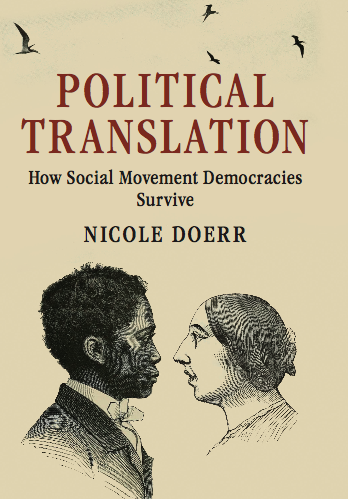Political Translation: How Social Movement Democracies Survive
 Associate Professor Nicole Doerr has written the publication 'Political Translation: How Social Movement Democracies Survive' - a comparative study of study of deliberation under conditions of linguistic difference and cultural misunderstandings. Nicole Doerr's research in general investigates how and under what conditions increased linguistic and cultural diversity fosters democratic innovation in the areas of social movements, local democracy and participation by migrants, refugees, and minorities.
Associate Professor Nicole Doerr has written the publication 'Political Translation: How Social Movement Democracies Survive' - a comparative study of study of deliberation under conditions of linguistic difference and cultural misunderstandings. Nicole Doerr's research in general investigates how and under what conditions increased linguistic and cultural diversity fosters democratic innovation in the areas of social movements, local democracy and participation by migrants, refugees, and minorities.
At a time when the legitimacy of democracies is in question, it calls to improve the quality of public debate and deliberative democracy are sweeping the social sciences. Yet, real deliberation lies far from the deliberative ideal. Theorists have argued that linguistic and cultural differences foster inequality and impede democratic deliberation. In this empirical study, Nicole Doerr presents the collective practices of political translation, which help multilingual and culturally diverse groups work together more democratically than homogeneous groups. Political translation, distinct from linguistic translation, is a set of disruptive and communicative practices developed by activists and grassroots community organizers in order to address inequities hindering democratic deliberation and to entreat powerful groups to work together more inclusively with disempowered groups. Based on ten years of fieldwork, Political Translation provides the first systematic comparative study of deliberation under conditions of linguistic difference and cultural misunderstandings.
Nicole Doerr, Political Translation: How Social Movement Democracies Survive, Cambridge University Press, 2018.
